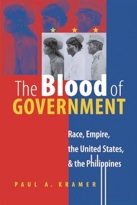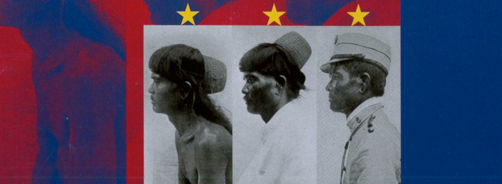(Chapel Hill: University of North Carolina Press 2006)
In 1899 the United States, having announced its arrival as a world power during the Spanish-Cuban-American War, inaugurated a brutal war of imperial conquest against the Philippine Republic. Over the next five decades, U.S. imperialists justified their colonial empire by crafting novel racial ideologies adapted to new realities of collaboration and anticolonial resistance. In this pathbreaking, transnational study, Paul A. Kramer reveals how racial politics served U.S. empire, and how empire-building in turn transformed ideas of race and nation in both the United States and the Philippines.
Kramer argues that Philippine-American colonial history was characterized by struggles over sovereignty and recognition. In the wake of a racial-exterminist war, U.S. colonialists, in dialogue with Filipino elites, divided the Philippine population into “civilized” Christians and “savage” animists and Muslims. The former were subjected to a calibrated colonialism that gradually extended them self-government as they demonstrated their “capacities.” The latter were governed first by Americans, then by Christian Filipinos who had proven themselves worthy of shouldering the “white man’s burden.” Ultimately, however, this racial vision of imperial nation-building collided with U.S. nativist efforts to insulate the United States from its colonies, even at the cost of Philippine independence. Kramer provides an innovative account of the global transformations of race and the centrality of empire to twentieth-century U.S. and Philippine histories.
AWARDS & DISTINCTIONS
2007 Stuart L. Bernath Book Prize, Society for Historians of American Foreign Relations
2007 James A. Rawley Prize, Organization of American Historians

Available in paperback, or ebook.
REVIEWS
“The Blood of Government is a groundbreaking study of the complex history of American colonial rule in the Philippines. Kramer reinterprets the concept and practice of race as a rich and complex framework for political and cultural inquiry into the history of imperialism. He demonstrates persuasively how colonial relations were not a one-way imposition of power from metropolis to periphery, but consisted of genuine contacts and interactions, forged by violence, conflict, collision, and collaboration.” —Amy Kaplan, University of Pennsylvania
“In Kramer’s book, we see new ways of articulating areas of historical inquiry—the imperial and the national, colonialism and immigration, war and racial formation, American, Asian and Asian-American histories—in ways that are as inventive as they are compelling.” —Vicente Rafael, Kritika Kultura
“This is an impressive book… [Kramer] writes in an accessible but deeply learned manner, bringing to bear his expertise on the subject and perhaps staking a claim for the study of U. S. Empire as having a complexity, allure, and integrity that has only been granted to post-colonies of the former British Empire. In doing so, Kramer helps to anchor post-colonial studies of U. S. Empire in the Philippines. Of these, Kramer’s is thus far the most ambitious in scope and also the most transnational, examining developments in the United States metropole that puts Philippine studies in dialogue with transnational American studies.” —Augusto Espiritu, Reviews in American History
“The book is deeply researched in Spanish, Philippine and U. S. archives. It is richly illustrated, clearly written, and full of vividly conceptualized terms… Kramer goes far towards reaching his goal of a history without ‘boondocks’—that is, a history in which no place is marginal… The skilful way in which Kramer interweaves cultural, social, military, and political narratives makes his book a standard-setter in international history. It is a must-read for historians interested in imperial culture, racial formation, comparative empires, and nationalism, as well as for those with area-studies interests in Philippine and U. S. history.” —Kristin Hoganson, International History Review
“At every stage of Kramer’s analysis, the reader is made aware of the Filipino side of the story of U.S.- Philippine relations. . . . Kramer delves deeply into the Filipino past in order to reconstruct how they (in particular, their elites, ilustrados, and the revolutionaries, the Katipunan) viewed themselves when they encountered Americans.” —Akira Iriye, Harvard University
“Meticulously researched and lucidly written, Paul Kramer’s The Blood of Government details America’s first-ever attempt to engage in overseas ‘nation-building’… For scholars of race and ethnicity, [it] illuminates the intimate connection between the history of empire and domestic racism, suggesting that Asian American racial formation has been determined not exclusively by events in the United States but also by US (neo)colonialism in Asia.” —Yen Le Espiritu, Ethnic and Racial Studies
“Grace and rigor are two opposite concepts that would be difficult to incorporate… Through meticulous and painstaking research, nimble prose, an engaging story, and a range of emotions, Paul Kramer has managed it… with this exemplary piece of scholarship.” —Ma. Teresa Pineda Tinio, Philippine Studies
